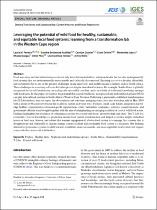| dc.contributor.author | Pereira, Laura M. | |
| dc.contributor.author | Kushitor, Sandra Boatemaa | |
| dc.contributor.author | Willis, Jenny | |
| dc.date.accessioned | 2022-08-31T07:32:17Z | |
| dc.date.available | 2022-08-31T07:32:17Z | |
| dc.date.issued | 2022 | |
| dc.identifier.citation | Pereira, L. M. et al. (2022). Leveraging the potential of wild food for healthy, sustainable, and equitable local food systems: Learning from a transformation lab in the Western Cape region. Sustainability Science. https://doi.org/10.1007/s11625-022-01182-3 | en_US |
| dc.identifier.issn | 1862-4057 | |
| dc.identifier.uri | https://doi.org/10.1007/s11625-022-01182-3 | |
| dc.identifier.uri | http://hdl.handle.net/10566/7789 | |
| dc.description.abstract | Food insecurity and diet-related diseases do not only have detrimental efects to human health, but are also underpinned by
food systems that are environmentally unsustainable and culturally disconnected. Ensuring access to a healthy, afordable,
and sustainable diet is one of the greatest challenges facing many low- and middle-income countries such as South Africa.
These challenges in accessing a diverse diet often persist despite biocultural richness. For example, South Africa is globally
recognised for its rich biodiversity, an ecologically unrivalled coastline, and a rich body of traditional knowledge amongst
wild-food users. In this paper, we explore the potential that coastal wild foods as neglected and underutilised species (NUS)
can play in local food systems in South Africa’s Western Cape Province. | en_US |
| dc.language.iso | en | en_US |
| dc.publisher | Springer | en_US |
| dc.subject | Healthy diets | en_US |
| dc.subject | Sustainability transformations | en_US |
| dc.subject | Coastal wild foods | en_US |
| dc.subject | Western Cape | en_US |
| dc.subject | Food security | en_US |
| dc.title | Leveraging the potential of wild food for healthy, sustainable, and equitable local food systems: Learning from a transformation lab in the Western Cape region | en_US |
| dc.type | Article | en_US |

